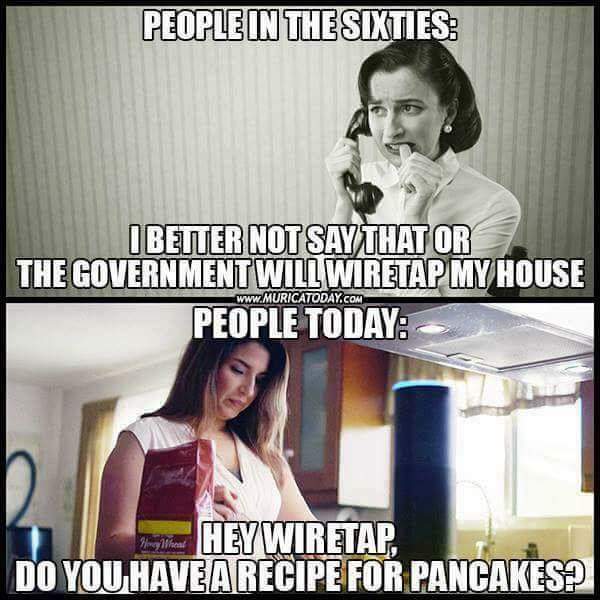Christine Rex

Monday through Friday I work in marketing. Friday nights I turn into swim mom. This past weekend found me at a swim meet in DC, at a notoriously noisy swim complex. Having completely checked out of work life the day prior, my ears immediately perked up when I heard a woman screaming, “Alexa!”
Increasing Artificial Intelligence (AI) has many of our clients, global consumer product goods (CPG) companies, fearful of their future. My weeks have turned into meetings not about how to familiarize potential customers with new products, but rather how to make sure when a customer is ordering via AI they are naming the brand; “Alexa, order more GoGo Squeez applesauce,” rather than “Alexa, order more applesauce.”
It’s so common place in our current lexicon to hear prompts for Alexa or Google, that I had to do a double take on the pool deck determining who was using voice AI to order from amazon at a noisy swim meet. Spoiler alert, it was a mom looking for her daughter, named “Alexa.”

What was once only a fixture on the Jetsons is today’s new normal. Americans are welcoming into their living rooms and kitchens smart speakers. These bots, like our friends Alexa and Google, have become the fastest growing consumer technology (Simms, 2019) with fan favorite Alexa dominating 70% of the US market (Chaudhuri & Terlep, 2018).
It’s this change that eliciting fear amongst iconic CPG brands. Graeme Pikethly, Unliever’s CFO recently expressed the impact smart speakers will have on the future of commerce.
“Of all the disruptions that are taking place in all the things technology is bringing into our space, voice is among the most disruptive,” (Chaudhuri & Terlep, 2018).
This disruption is forecasted to have the largest impact on low cost consumer staples (Perez, 2019). Consumers searching for higher priced goods are more likely to conduct research, see the product. Small staple goods, on the other hand, are perfectly suited for a quick ordering platform like those offered by Amazon and Google (Molla, 2018).
The underlying algorithms of Alexa and Google steer shoppers to one product picked by an algorithm if the customer does not explicitly say a brand (Chaudhuri & Terlep, 2018). In the case of Alexa, products are selected based on two criteria. In the first instance products are chosen from Amazon’s Choice, a subset of products that are the most requested on the platform. The second criteria is a default to Amazon’s private brand (Chaudhuri & Terlep, 2018).
To correct this gap and create an agonistic platform for all competing brands, consumer behavior would have to adapt such that when a customer is ordering via Alexa or Google, they expressly identify the brand (Simms, 2018). This would reset the algorithm and subsequent reordering would take into account previous purchases from the user utilizing the machine learning capabilities model of these platforms which is structured to improve over time towards individualized customer preferences (Chaudhuri & Terlep, 2018).
In lieu of a level playing field, global brands are now playing catchup in an effort to redirect consumer behavior when ordering through voice AI, and are against a ticking clock. It’s estimated that within a year nearly 2 billion people will be ordering through smart speakers (Guo, 2018) constituting roughly $40 billion of commerce by 2022 (Simms, 2019). To further complicate CPG brand’s lives, voice AI is expanding beyond kitchens and living rooms. Notable automobile manufacturers, like Mercedes and Audi, are testing voice AI systems, like Alexa, that allow drivers to shop for groceries, or make spontaneous purchases from the driver’s seat (Simms, 2018).

As a consumer, that is pulled in a hundred directions, I am constantly looking for the easiest path forward, particularly when it comes to everyday mundane tasks like groceries. I personally have not been to the grocery store in months after Amazon Prime began offering two hour delivery to my front door.
The Greek philosopher, Heraclitus, said in 500bc, “change is the only constant in life,” (Mark, 2010). Hearing Alexa’s mom on the pool deck reminded me that I needed to reorder my groceries for the week. Two clicks later, Amazon was on its way to my home stocked with my preferential grocery list from my months of ordering via the platform, all from a noisy pool deck.
REFERENCES
Chadhuri, S., & Terlep, S. (2018, February 27). The Next Big Threat to Consumer Brands (Yes, Amazon’s Behind It). The Wallstreet Journal. Retrieved from https://www.wsj.com/articles/big-consumer-brands-dont-have-an-answer-for-alexa-1519727401
Guo, M. (2018, October 22). How Brands Can Win the Battle of a Voice-Driven World. Kantar China Insights. Retrieved from https://us.kantar.com/business/brands/2018/the-rise-of-voice-assistants-and-the-challenge-for-brands/
Mark, J. (2010, July 14). Heraclitus of Ephesus. Ancient History Encyclopedia. Retrieved from https://www.ancient.eu/Heraclitus_of_Ephesos/
Molla, R. (2018, November 26). Amazon wants brands to advertise Alexa voice shopping — essentially for free. Vox. Retrieved from https://www.vox.com/2018/11/26/18106834/amazon-alexa-advertising-cpg-voice
Perez, S. (2019, February 12). Report: Voice assistance in use to triple to 8 billion by 2023. Techcrunch. Retrieved from https://techcrunch.com/2019/02/12/report-voice-assistants-in-use-to-triple-to-8-billion-by-2023/
Simms, K. (2019, May 15). How Voice Assistants Could Change the Way We Shop. Harvard Business Review. Retrieved from https://hbr.org/2019/05/how-voice-assistants-could-change-the-way-we-shop

7 Responses to “Hey Google, you take it from here!”